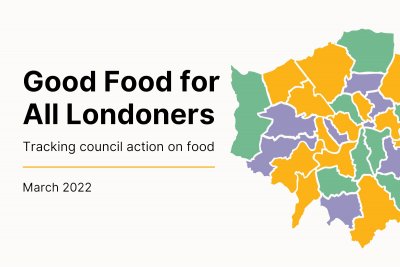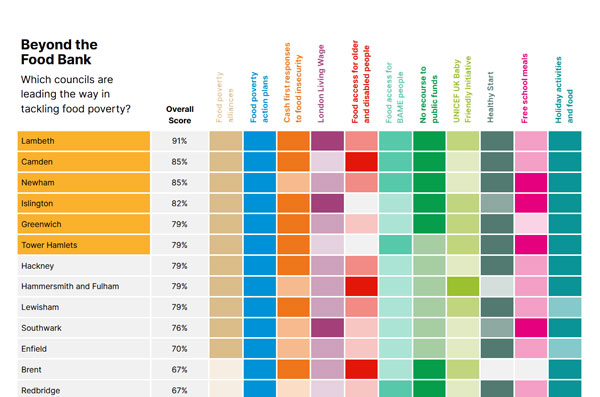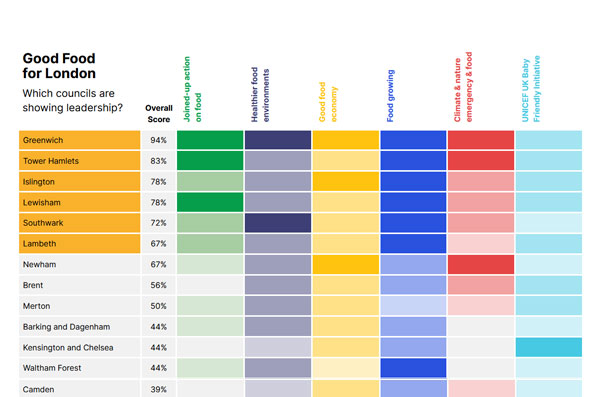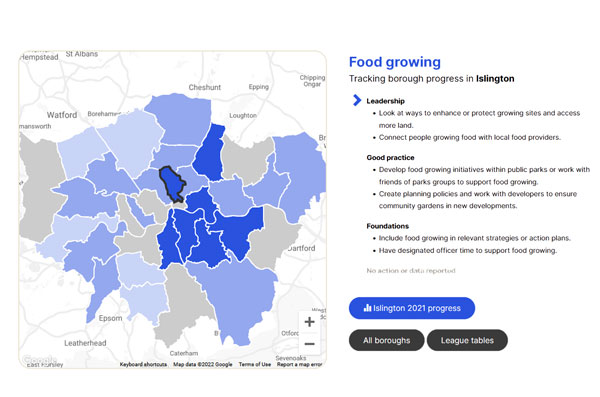New Sustain report shows London councils are serving up good food as part of pandemic recovery
The Good Food for all Londoners report, published by Sustain's London Food Link, reviews council action on food under two key themes: tackling food poverty, and how they’re bringing good food to the borough, which covers action on climate and food for the first time.

The report, combining previous annual reports, Beyond the Food Bank and Good Food for London, is based on councils’ responses to a survey on food issues covering household food insecurity, healthy food environments, climate action and the wider food economy, alongside key data from other partners including the London Living Wage and UNICEF Baby Friendly Initiative.
From the 28 councils who took part in this year’s report, four – Greenwich, Islington, Lambeth and Tower Hamlets – have shown cross-cutting leadership across both themes. Camden and Newham are celebrated for achieving leadership in their initiatives that go beyond the food bank, and Lewisham and Southwark for achieving leadership in how they support people living in the borough to eat healthily and sustainably.
Cllr Jim Dickson, Lambeth’s Cabinet Member Health & Social Care, said:
“I welcome this report which highlights an incredibly important area of work for families suffering the greatest inequality in our capital city. While there is huge wealth, there are also families who struggle to put food on the table for their children. We know healthy and nutritious food is crucial for giving our young people a good start in life which is why Lambeth Council is so committed to addressing this very real challenge, putting in place concrete measures at local level to tackle food poverty and to ensure our residents can buy and eat healthy, sustainable food. That includes The Lambeth Food Poverty and Insecurity Action Plan which recognises that food insecurity disproportionately occurs amongst less well-off families including those from Black, Asian, and Multi-Ethnic households. The report also highlights Lambeth’s leadership in fostering the London Living Wage which is vital in raising incomes to help people move out of poverty so they can access and choose their own food.”
The findings show councils are putting time and resources into tackling food poverty and it’s causes with 20 councils having food poverty alliances in place. Almost all of these have food poverty action plans to track action to building more resilient local food supply. This is seen as even more critical with more people than ever using food banks during the Covid-19 crisis, and food and fuel prices set to rise this year in the UK.
Highlights in the Good Food for London section show a joined-up approach to food, including action on food growing, with seven councils demonstrating leadership and numerous examples of how work with other local groups and voluntary organisations is increasing opportunities for people to access fresh produce.
Sarah Williams, Programmes Director at Sustain said,
“We are delighted that councils have engaged in the report, despite the challenges, and that so many are making progress to tackle root causes as well as progressing initiatives that make a difference to the life of Londoners right now. Those councils showing leadership have demonstrated that you can balance the needs of future generations, with the needs of the here and now. But we also need to be able to hold all councils accountable to take action across a range of issues including climate and food and the food economy where we feel there is still much more work to be done to join up council actions with food.”
Amongst other measures, the report highlights the huge opportunity councils have to tackle the climate and nature emergency through food. The climate and nature emergency is a huge and immediate threat and whilst many councils have declared a climate and nature emergency, 19 out of 33 reported little or no action so far to integrate and deliver changes to their local food system as part of their climate mitigation strategies. The report calls on councils to take a number of actions in this theme, including signing up for the Every Mouthful Counts toolkit as part of the Food for the Planet campaign. Yesterday, Sustain launched a new programme of grants for local councils and groups to support local campaigns to make food more climate-friendly.
Ruth Westcott, Campaign Coordinator at Sustain said,
"Councils have a great deal of power to reduce the huge impact of the food system on our climate, wildlife and people’s health. This includes the food councils buy, the land they manage, how they deal with food waste, how food is advertised and promoted, and how they support local food businesses. Once you tot up the emissions reductions saving from even relatively simple and low-cost actions, it’s clear that action on food can make a big contribution to councils’ climate change commitments. It’s great to see some councils pledging to cut consumption-based emissions, signing the Glasgow Food and Climate Declaration and committing to more climate-friendly school meals. However, now it is urgent that we move from commitments to action. The climate crisis is worsening and the poorest are already experiencing the greatest impacts. All councils can sign up to the Every Mouthful Counts toolkit to get inspiration about reducing food-based emissions, and celebrating and recognising progress."
Find out how your council fared in the themes covering food poverty alliances, cash first approaches, food access, children’s food, joined up action on food, healthier food environments, good food economy, food growing and the climate and nature emergency and food.
01/03/2022
Support our work
Your donation will help communities grow more food in gardens across London.
Capital Growth is a project of Sustain: the alliance for better food and farming.
Expert food growers wanted for Capital Growth’s 2025 training program
Celebrate the abundance in London this September with Urban Harvest
Behind the garden gate: how London’s food gardens are producing much more than just food







